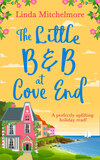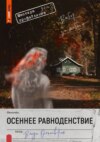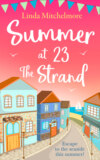Читать книгу: «The Little B & B at Cove End»
The Little B&B at Cove End
LINDA MITCHELMORE

HQ
An imprint of HarperCollinsPublishers Ltd
1 London Bridge Street
London SE1 9GF
This edition 2019
1
First published in Great Britain by
HQ, an imprint of HarperCollinsPublishers Ltd 2019
Copyright © Linda Mitchelmore 2019
Linda Mitchelmore asserts the moral right to be
identified as the author of this work.
A catalogue record for this book is
available from the British Library.
This novel is entirely a work of fiction. The names, characters
and incidents portrayed in it are the work of the author’s
imagination. Any resemblance to actual persons, living or
dead, events or localities is entirely coincidental.
All rights reserved. No part of this publication may be reproduced,
stored in a retrieval system, or transmitted, in any form or by any means,
electronic, mechanical, photocopying, recording or otherwise,
without the prior permission of the publishers.
This book is sold subject to the condition that it shall not, by way of trade
or otherwise, be lent, re-sold, hired out or otherwise circulated without
the publisher’s prior consent in any form of binding or cover other than
that in which it is published and without a similar condition including this
condition being imposed on the subsequent purchaser.
Source ISBN: 9780008330972
E-book Edition ISBN: 9780008327743
Version: 2019-04-24
Readers love Linda Mitchelmore
‘The perfect book to take on holiday.’
‘It’s inspired me to go on a little holiday of my own.’
‘By the end of the book I wanted to sit on the veranda with a glass of wine, eat fish & chips and visit the local café.’
‘A wonderful summer read.’
‘Charming and uplifting.’
‘Such a delightful, uplifting and heartwarming read.’
‘A lovely book to read on holiday.’
‘Fabulous.’
Table of Contents
Cover
Title Page
Copyright
Readers love Linda Mitchelmore
Dedication
Chapter One
Chapter Two
Chapter Three
Chapter Four
Chapter Five
Chapter Six
Chapter Seven
Chapter Eight
Chapter Nine
Chapter Ten
Chapter Eleven
Chapter Twelve
Chapter Thirteen
Chapter Fourteen
Chapter Fifteen
Chapter Sixteen
Chapter Seventeen
Chapter Eighteen
Chapter Nineteen
Chapter Twenty
Chapter Twenty-One
Chapter Twenty-Two
Chapter Twenty-Three
Chapter Twenty-Four
Chapter Twenty-Five
Chapter Twenty-Six
Chapter Twenty-Seven
Chapter Twenty-Eight
Chapter Twenty-Nine
Acknowledgements
Extract
Dear Reader …
Keep Reading …
About the Author
About the Publisher
Mike and Barbara Adams – for a lifetime of support, generosity, and love.
Chapter One
‘But Mae, we have to eat!’ Cara said, standing in the hallway, the flyer for the art festival in her hand: LARRACOMBE TO CHALLENGE ST IVES 3rd–7th AUGUST, it said in fancy script. There was a list of artists who would be showing their work and giving talks and workshops – Elisabeth James, Janey Cooper, Stella Murphy and Tom Gasson-Smith amongst others, although Cara hadn’t heard of any of them. The festival was six weeks away, but she was thinking fast. She would have enough time to get her B&B up and running, and a bit of experience under her belt. August was high summer when high prices could be charged. There would be lots of people coming from further afield to the festival, people wanting somewhere to stay. There was even a number to ring for anyone able to host artists. Cara would ring just as soon as she had calmed Mae down a bit and reassured her that Cove End would still be very much their home, even though they’d need to take in paying guests to survive.
‘Didn’t Dad leave anything, Mum? Anything at all?’
Mae was practically screaming the words at her.
‘Sssh. Don’t shout, darling. We don’t want everyone to know our business.’
‘Huh. You tell Rosie everything.’ Mae tossed her head of auburn curls and dragged her fingers through her hair, straightening and then tweaking the curls she loved and hated in equal measure, depending on her mood. Cara had a feeling she hated those curls at that moment.
‘Keep your voice down. It’s not nice to talk about people behind their backs. Rosie can probably hear you.’
Mae gave a couldn’t-care-less shrug and Cara did her best to remember how it had been when she’d been on the cusp of womanhood herself – the moods, the angst, the lack of self-confidence sometimes.
Cara’s friend, Rosie, was still in Cara’s kitchen. She’d come over for Sunday lunch as she often had since Cara had been widowed, and the three of them – Cara, Mae and Rosie – had created a family of sorts. Yes, they were good friends and looked out for one another, but Cara did not tell Rosie everything.
‘I do not tell Rosie everything,’ Cara said, keeping her voice calm. ‘But to answer your question, all your dad left us was the house.’
And that had always been in my name anyway in case of bankruptcy, but there was no need for Mae to know that.
‘I want to believe you, Mum,’ Mae said, screwing her eyes up tight, which Cara knew was just so the tears that were threatening didn’t fall, ‘I really do, but I can’t quite. I mean, Dad loved us, right?’
In his way, Cara wanted to say. But just not enough to stop gambling; not enough that he didn’t sell anything he could to fund his addiction; not enough that he wasn’t open and honest with us both.
‘He loved you very much, you know that.’
Cara hoped that would be the answer her daughter needed and wanted in that moment.
‘Yeah,’ Mae said, slowly, letting the word out like a sad sigh. And there was a tiny twitch at the corners of her mouth, the beginnings of a smile as though she was remembering the good times with her father and all they had been to one another. And then she took a deep breath and pulled herself up tall. ‘Yeah, well, try and remember it’s my house, too. I’m not moving out of my bedroom for any stupid B&B guests. Dad would never, ever, have wanted me to do that. Okay?’
‘Of course I won’t move you out of your room. Don’t worry,’ Cara said, weary of the fight she was having with her fifteen-year-old daughter over her new venture.
‘Couldn’t you get a job or something?’ Mae asked, arms folded across her chest, a pout on her face. ‘Go back to working in a bank or something, like you did before you had me?’
‘No, I’ve been out of it too long for that. Things have changed so much in fifteen years I’d need too much training to even get in at the lowest level. I’m not computer-literate enough for a start.’
‘Making stuff, then? Clothes. You’re good at that. The vintage dresses Dad bought me and you copied when I’d worn them and worn them and they were falling apart in the end because I’d worn them so much and the material was, like, ancient anyway, or I’d grown out of them … you always did that brilliantly. You could start a business – haute couture or something.’
‘It’s a lovely thought, darling,’ Cara said, hugging her daughter’s compliment to her because they came so rarely these days. But in her heart Cara knew it would be an impossible business to get into with just a now very ancient Singer sewing machine. She’d need a machine to do overlocking for a start and she just didn’t have the money. Or, as she’d said a moment ago, the computer skills to sell her product online, although she could learn that if she had to. ‘But I’m no Stella McCartney.’
‘Duh!’ Mae said, slapping her forehead theatrically. ‘You don’t need to be Stella McCartney, or anyone else, Mum. You just have to make good stuff that people want and …’
‘Enough, Mae,’ Cara interrupted. Mae was making a very decent argument about what she could do to get them out of the financial mess they were in, but Cara had already thought of all that; been awake night after night thinking those same things and if she could get any of them to work. ‘Now go and meet Josh and have a lovely time.’
‘I’m already gone,’ Mae said, hurrying towards the door, not stopping to peck her mother’s cheek as she usually did.
Cara followed more slowly, stepping out onto the terrace. She pressed her lips together, forcing a smile she didn’t feel as Mae turned round for a brief moment before scurrying off. Mae was so pretty and never afraid to be different from her peer group. She was wearing the ballerina-length, black cabbage roses on a white ground, antique dress that had been her favourite since the day Mark had bought it for her from the vintage shop in Totnes. The fabric – starched to within an inch of its life – crackled as Mae walked. A black cardigan was draped over her shoulders, a simple, fine wool but faded.
‘Don’t be too late, Mae,’ Cara called after her, stepping out onto the terrace. ‘Please.’ But the breeze off the sea snatched her words away, blew them back in her face.
But perhaps Mae had heard because she turned, teased some tendrils of hair down each side of her face – a habit of long-standing – and Cara resisted the urge to rush down the path and hold her daughter to her lest it be the last time she ever saw her. Mae pointed at the sign Cara had painted, clapped a hand over her mouth to indicate suppressed laughter, then disappeared from view.
The hastily made sign – COVE END B&B – that Cara had made using some old paints of Mae’s she’d found in the toy cupboard, on a square of hardboard that had been propped up against the garage wall for as long as Cara could remember, swung back and forth, banging against the slim trunk of the lilac tree as Cara returned to the kitchen. She’d managed to find two hooks, screwing them into the bottom of the board on which hung a strip of hardboard with VACANCIES on one side and NO VACANCIES on the other.
‘Tea? Coffee? Something stronger?’ Rosie asked.
‘Tea, please. How sad would it be if I turned into a dipso widow-slash-single mother?’
‘But you’re not going to,’ Rosie said. ‘And you didn’t have to let her go. She’s only fifteen for goodness’ sake. You could have said no, you know. Mae is way too young for Josh Maynard. Or Josh is way too old for her. Whichever way you want to look at it.’
‘Not in Mae’s opinion,’ Cara said with a small sigh. ‘Or Josh’s, I suspect. If I forbade her to see him, she’d only find a way, behind my back, to meet him. Forbidden fruit and all that.’
‘How long have they been seeing each other?’ Rosie asked, arms folded across her chest and her hands tucked firmly under her armpits. Cara saw it for the gesture it was – disapproval. And Rosie wasn’t going to be moved on her opinions either.
‘Not long. Three months. Maybe four. Only at weekends because of school. Anyway, what is this? The Spanish Inquisition?’
Josh was good about bringing Mae home on time and Cara had to be thankful for that.
‘It’s only because I love you both,’ Rosie said. ‘I wouldn’t want more angst and drama dropped on you. You know, young girl who thinks she knows it all but doesn’t, and older man who knows it all and doesn’t give a fig who he uses to get his own way and …’
‘Rosie, you are …’
‘I know.’ Rosie thrust out an arm, traffic policeman-style, to halt Cara’s objections. ‘I’m out of order. Way out of order. But I’ve been that girl, done that, got the bloody T-shirt. It doesn’t alter the fact that Josh is twenty. He gets through girls the way most lads his age get through hair gel or whatever the latest fad fashion is these days. Ask anybody in this place and they’d say the same about Josh.’
‘Oh God,’ Cara said. ‘That’s the trouble with this place: everyone knows everyone else. Mae’s almost sixteen – she has to grow up sometime. If all I had to worry about was Mae seeing Josh Maynard, I’d be a happy woman.’
It was common knowledge in the village that Josh had been a bit of a rebel in his teenage years, railing against everything his father, a vicar, believed in. He’d left school in the middle of his A levels, stopped going to church on Sundays with his mother and sister, and loped from part-time job to part-time job with no real vision of his future. He was a regular at both village pubs and rumour had it he’d smoked pot for a while. Cara rather hoped he wasn’t doing that any more, but was wary of asking Mae if he was. But Cara knew Josh wasn’t the only one who had done these things. Hadn’t Cara herself gone through life to date with no clear vision? She’d even smoked pot – just the once because it had made her very sick and frightened the life out of her. Time, she decided, to shift the focus from Josh Maynard in this conversation.
‘Who else knows, do you think? About Mark, I mean, and his gambling.’
Cara bit the insides of her cheeks to stop her tears. She was sick of tears. Sick of the reason for them; Mark had spent every single penny of their savings on internet gambling, or down at the bookie’s betting on horses or dogs or both. The dinghy Mark had bought for Mae, and which she loved with all her heart, had been sold. Cara’s little Fiat 500 had been sold. Anything of any value had been sold so that Mark could gamble. Things disappeared – almost without Cara noticing sometimes – piece by piece. Mark had been crafty, taking a painting then regrouping the others so that it had taken Cara a while to notice it was missing. Amongst them had been three paintings she’d inherited from her great-grandmother, Emma. Two woodland scenes and a harbour scene. Emma’s first husband, Seth Jago – a gifted but amateur artist, so family folklore had it – had painted them back in the early 1900s. The only painting of Seth Jago’s that Mark hadn’t taken was a portrait of Emma that had been at the picture framer’s in Sands Road having a repair done to the corner of the frame where Cara had knocked it off the wall when she’d been dusting. Thank God she still had that because on that fateful night, Mark’s car had spun out of control at a roundabout and he’d been killed. Every other painting Cara had collected during their marriage – all fifteen of them – had been ruined beyond any hope of repair when the car had caught fire after Mark had been pulled free by the fire crew. Stuff in the boot had been saved, but not all the things on the back seat, the paintings amongst it. Cara often wondered where those other paintings of Seth Jago’s might be, but in a strange way she was glad they hadn’t become victims of Mark’s fatal accident, because they’d vanished from Cove End a long time before that.
Tell me, Rosie,’ Cara said as she sipped the tea her friend had made her, ‘is the whole village talking about me?’
‘Well, yes. Of course they are. Not as much as when Mark died because that was a shock to everyone I expect, but you’re probably still good gossip fodder.’ Rosie’s reply was swift and honest. ‘You’re only thirty-nine. You’re a widow. They’re sad for you, that’s all.’
Cara studied Rosie’s face as she spoke, trying to see lies in her friend’s eyes, the way she’d known there were lies in Mark’s eyes every time he’d said he hadn’t gambled that day, nor the day before, and that he wouldn’t gamble tomorrow. Whenever she’d challenged him, demanding to know where her silver, or her paintings, or her household goods had gone, Mark always said he’d replace everything just as soon as he’d won enough on the next throw of the dice. Always the next throw of the dice would sort everything. Except it never did. It was all lies, lies, lies. But Rosie’s eyes were wide and clear as they focused on Cara’s almost royal blue ones.
‘But they know?’
‘I think some of them do, yes. When a man starts selling his own household goods down the pub, people are going to know something’s up. Andy Povey at the Beachcomber has a pretty good idea what Mark was up to because he bought Mark’s watch off him. Amongst other things, no doubt.’
‘Oh great. The pub landlord knows so now the whole village knows.’
Cara never went in the village pub, so at least she’d been saved from any knowing glances, and she felt oddly glad of that now.
‘Not necessarily. A pub landlord’s a bit like a priest at confessional but without the divine right to dish out Hail Marys. I expect with Andy, most of what he hears goes in one ear and out the other. He’s a good bloke.’
‘Did Andy tell you he knew about Mark?’ Cara had to know. She was no shrinking violet, but now she’d need nerves of steel to walk down the street if Andy had told all his customers.
‘He had a quiet word with me in Sainsbury’s. Because he knows we’ve been friends forever, you and me.’
‘In Sainsbury’s? With the world and his wife listening in?’
‘I’m not going to answer that,’ Rosie said. ‘I can do discreet, you know. As can Andy Povey when he sees a need.’
‘Of course. I’m sorry,’ Cara said. ‘I don’t know how you’ve put up with my outbursts at times.’
‘Because I’m a saint,’ Rosie laughed. Then she looked serious. ‘No, I’m no saint, as you know. But you are my dearest friend, and I am Mae’s godmother, and I care about you both. And I would, quite literally, give an arm for you not to be in this situation, but we both know that can’t happen.’
Cara nodded.
‘Thanks,’ she said, ‘for being there for me.’
‘No worries. Now, if you don’t need me to give you more advice on how to bring up your teenage daughter, I’d better buzz. I’ve got two eyebrow tints, a leg wax, then two Brazilians followed by a manicure on the books. And a thirty-minute drive to my salon, so …’
Rosie had hit on the idea of opening her salon on Sunday evenings for women and girls who worked nine to five and couldn’t make weekday or daytime appointments, and who – perhaps – didn’t want to cut into their weekend time off by going to a beauty salon on a Saturday when they could be shopping or out with their mates. It was really taking off. But if she was honest, Cara was missing Rosie’s company; needing it now more than ever. The first six months after Mark’s death had been a mad scramble to sort the legal aspects that result from a sudden death, and Cara had got through it on automatic pilot almost. Then came the year of ‘firsts’ followed by a time of mourning for the good times she and Mark had shared, and a feeling of loss that they would now not have a future.
‘No, I’m fine,’ Cara said, feeling anything but. ‘You go. I need to sort out bed linen and crockery and so on. Then I’ve got to think of something to send to the paper about putting in an ad for the B&B. With this art festival coming up, I can’t fail to get guests, can I?’
Cara took a deep breath. And I’ve got to try not to worry about Mae being with Josh Maynard and whether he is pushing Mae into having underage sex, and work out how many rooms I will need to fill to pay the rates and the supermarket and for Mae to go to Paris with her school in September, she thought. Her head was a maelstrom of random thoughts, and she was starting to get a headache between her eyes.
‘It’s hardly St Ives here,’ Rosie said. ‘I mean, Larracombe? Two pubs, one church, a harbour that holds about a dozen boats, two gift shops and a handful of cottages. And a half hour drive to a decent supermarket. I don’t know what all the fuss is about. It’s all over the village that some famous painter is coming. I mean, now this house is denuded of paintings, do you really want an art festival thrown in your face?’
‘I need the money,’ Cara said quietly. Just as soon as she was alone she’d ring the number on the bottom of the flyer and register. ‘And I thought you were in a hurry to go.’
Rosie laughed.
‘Bugger off, you mean,’ she said. Rosie reached for her bag, rifling through it for her keys. ‘But think about it, eh? I wouldn’t want you to have any more pain – emotionally that is – than you already have.’
‘I have thought about it,’ Cara told her. She glanced at the darker patches on the kitchen wall where her beloved paintings had been, knowing the walls in every other room in the house looked the same. ‘Anyway, how hard can cooking bacon and eggs and a few rounds of toast be?’
Rosie had found her keys and jangled them at Cara.
‘For me, my love, it would be akin to penal servitude – a fate worse than death. Oh God, sorry. I didn’t mean death as in Mark, you know. I meant death as in the worst possible thing that could happen to a person and …’
‘Stop! You’re digging yourself in deeper. You’ll need a sparrow’s crane to get you out if you carry on. Go!’ Cara laughed, feeling the ripple of the laugh ease her pain, and the tightness in her chest, just a little. Even the headachey worry lines between her eyes were smoothing out a little. She reached out and held onto her friend’s hands, and for a moment the two women’s eyes locked before Cara looked away, afraid that Rosie would notice Cara was hiding lies of her own. Because what she hadn’t told anybody – not Rosie, the coroner, the police, or Mark’s parents was that as well as all her paintings, Mark had also taken most of his clothes and his computer because Cara, unable to put up with Mark’s gambling any more, had asked him to leave.
And would the guilt of that ever leave her? What if Mae were to even suspect that of her? What then?












